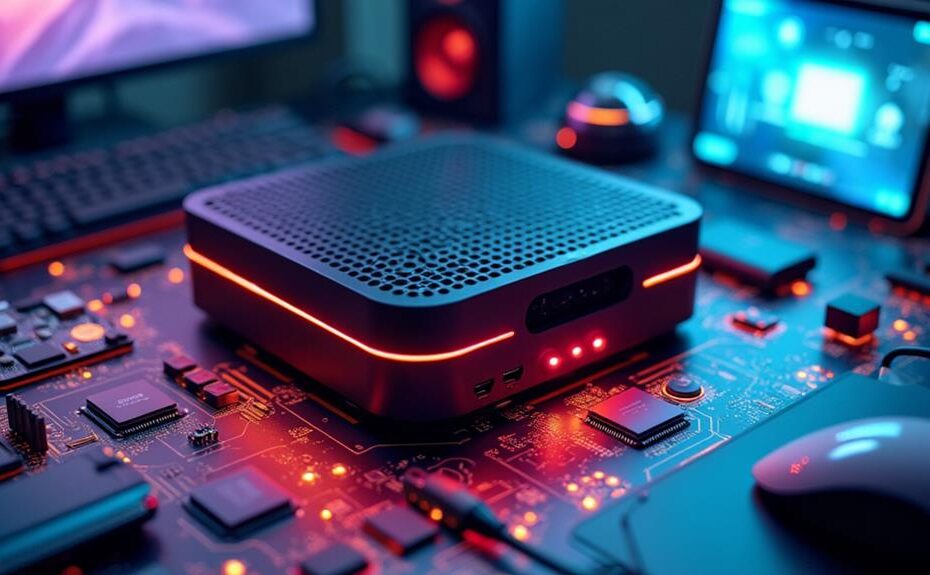



Recent advancements in mini PC technology focus on customization, AI integration, and energy efficiency. With Intel exiting the NUC product line, brands like Simply NUC and ASUS are stepping up, offering modular designs that allow you to upgrade components easily. These mini PCs now boast enhanced AI capabilities, ideal for edge computing applications. Additionally, improved GPUs provide high performance for gaming and content creation. They're also designed to be more energy-efficient, using SSDs and advanced cooling methods. There's a thriving community behind these innovations, enhancing customization and spurring future developments worth exploring further.
Key Takeaways
- The mini PC sector is evolving with enhanced modularity, enabling users to customize and upgrade components like RAM and storage easily.
- AI integration in mini PCs optimizes performance and supports real-time processing for applications in edge computing and IoT environments.
- Companies like Simply NUC and ASUS are filling the gap left by Intel's NUC exit, introducing new models with advanced features.
- Energy efficiency improvements include the use of SSDs and passive cooling systems, significantly reducing power consumption compared to traditional desktops.
- Community engagement among mini PC enthusiasts is fostering innovation through shared ideas, leading to diverse customization options and unique builds.
Recent Developments in Mini PCs
Recent developments in mini PCs have significantly reshaped the landscape of compact computing. The modularity trend has gained traction, allowing you to customize RAM, storage, and graphics to fit your specific needs, ultimately enhancing your user experience. For instance, the Beelink Mini PC features upgradeable RAM and SSD options, providing users with flexibility and performance enhancements. As Intel exited the NUC product line, companies like Simply NUC stepped in with new offerings such as the Onyx and Everglades 2, ensuring that small-form-factor computing remains relevant and innovative.
AI integration in mini PCs has also transformed their functionality, positioning them as ideal devices for edge computing and Internet of Things (IoT) applications. The Minisforum UM790 Pro stands out as a powerful option, capable of handling 4K video editing tasks in a compact design, making it an attractive choice for creative professionals. Additionally, products like the Beelink Mini PC Ryzen 7 5800H showcase impressive performance capabilities, enhancing multimedia editing and gaming experiences.
Furthermore, enthusiast communities have flourished this year, fostering a collaborative environment where users share unique setups, troubleshooting tips, and innovative ideas. This spirit of collaboration not only drives innovation but also enhances the overall experience of using compact computing devices. With these advancements, mini PCs are becoming essential tools for both everyday users and tech enthusiasts alike.
Intel's Exit From NUC
Signaling a major shift in the mini PC market, Intel's summer 2023 announcement of its exit from the NUC (Next Unit of Computing) business left many users and enthusiasts in a state of uncertainty. The NUC product line had been a cornerstone for compact computing solutions, particularly appealing to those who valued small form factor designs. Mini PCs are not only compact but also ideal for industrial settings, as their energy efficiency and robust features support remote monitoring applications across facilities. With Intel stepping back, the landscape of mini PCs is now in flux.
In response to this disruption, Simply NUC quickly launched new branded PCs, including Onyx, Everglades 2, and Zircon, aiming to fill the void left by Intel's departure. Meanwhile, ASUS acquired the NUC product line, ensuring continuity and safeguarding Intel's legacy in small form factor computing. This partnership not only maintains the NUC brand but also aims to enhance its capabilities in an evolving market.
This change highlights how technological advancements are reshaping the mini PC sector. While Intel's exit raises questions about future innovations, the involvement of companies like ASUS and Simply NUC suggests a commitment to sustaining and advancing the mini PC ecosystem. For you, staying informed about these changes is essential as the mini PC landscape continues to develop.
Customization Trends in Mini PCs
How are customization trends transforming the mini PC landscape? In 2023, a significant shift occurred towards user-driven customization, allowing you to tailor your mini PC's RAM, storage, graphics, and operating systems. This move away from pre-built systems has empowered users to create powerful systems that meet their specific needs. The growing demand for modular mini PCs has played a vital role in this transformation, particularly in sectors such as retail where the advantages of mini PCs can greatly enhance operational efficiency and customer experience. These devices enable you to easily upgrade components, enhancing performance and extending the lifespan of your systems. Companies like Simply NUC and ASUS are at the forefront, launching branded models that offer various configuration options, ensuring continuity in the NUC legacy while catering to individual preferences.
The flexibility in configurations has resonated with a diverse user base, leading to higher satisfaction rates and improved functionality. As you explore customization, enthusiast communities have emerged, fostering knowledge-sharing and innovative setups that push the boundaries of compact computing. This trend not only reflects a desire for personalized technology but also signifies a broader movement towards empowering users in their computing experiences.
Community Engagement Growth
In 2023, the mini PC community saw a remarkable surge in engagement, transforming how users interact with their devices and each other. Enthusiast forums and social media groups flourished, creating vibrant spaces for users to share their setups and troubleshooting tips. This growth in community engagement has been pivotal in enhancing the overall experience for mini PC users.
With increased interaction, customization options expanded greatly. Users began tailoring configurations such as RAM, storage, and operating systems to meet their specific needs. Knowledge-sharing platforms became essential for exchanging ideas about creative applications and innovative uses, fostering a collaborative atmosphere that encouraged experimentation.
This sense of camaraderie sparked collaborations among community members, leading to unique builds and innovative modifications that showcased the versatility of mini PCs. As users shared their successes and challenges, they contributed to a collective knowledge base that not only improved individual setups but also inspired future innovations.
Ultimately, the active engagement within the mini PC community has been a driving force behind technological advancements, positioning users at the forefront of this dynamic landscape. Your participation in these discussions can further amplify this growth, making you an integral part of the mini PC evolution.
Key Technological Innovations
The surge in community engagement around mini PCs has directly contributed to innovative breakthroughs in technology. One of the most notable advancements is modularity, allowing you to customize RAM, storage, graphics, and operating systems to fit your specific needs. This flexibility empowers users to tailor their systems for various applications, enhancing overall satisfaction.
Additionally, mini PCs are now integrating advanced AI capabilities, enabling them to perform complex operations that were once reserved for larger systems. This enhancement broadens their utility across multiple fields. With the increasing demand for edge computing solutions, mini PCs are being optimized for real-time processing, making them ideal for IoT and remote monitoring tasks.
Another considerable improvement lies in GPU performance, which has transformed mini PCs into capable gaming machines. They can now run high-end games and support virtual reality applications without compromising performance. Finally, energy efficiency remains a key focus; many mini PCs consume considerably less power than traditional desktops while delivering comparable performance. This combination of compact size and powerful capabilities positions mini PCs as a compelling choice for tech-savvy users looking for versatility and efficiency.
AI and Edge Computing Applications
As mini PCs continue to evolve, their integration with AI and edge computing is transforming how data is processed at the network's edge. In 2023, mini PCs equipped with advanced AI capabilities are enabling real-time processing of data generated by IoT applications. This shift allows for complex operations, such as machine learning and real-time data analysis, to occur locally, minimizing latency and enhancing bandwidth usage.
The compact size of mini PCs makes them ideal for deployment in diverse environments, including remote locations where space is limited. They serve as efficient local data processing units in sectors like healthcare and manufacturing, enhancing operational efficiency and expediting decision-making processes. With advances in GPU technology, these mini PCs are capable of handling demanding tasks, such as image recognition, natural language processing, and predictive analytics, making them indispensable in modern applications.
The rise of edge computing has positioned these devices as ideal solutions for managing the vast data generated by smart devices. By processing data at the edge, mini PCs greatly improve the responsiveness and reliability of IoT applications, paving the way for smarter, more efficient systems.
Energy Efficiency Enhancements
While energy efficiency is essential in today's tech landscape, mini PCs have made significant strides in reducing power consumption without sacrificing performance. These compact devices often feature energy-efficient processors, like Intel's low-power Core i3/i5 and AMD Ryzen series, which dramatically lower power usage compared to traditional desktop CPUs.
Moreover, many mini PCs now utilize solid-state drives (SSDs) instead of hard disk drives (HDDs). This switch not only boosts data access speeds but also reduces energy demands, making them more efficient overall.
Advances in thermal management technologies, such as passive cooling systems, further enhance energy efficiency. These systems allow mini PCs to maintain peak performance while consuming less power and generating less heat, which is a significant advantage in compact designs.
Additionally, the incorporation of power-saving features, including sleep and hibernation modes, helps minimize energy usage during inactive periods. It's also worth noting that many mini PCs now carry Energy Star certification, demonstrating compliance with strict energy efficiency guidelines. This not only contributes to reduced energy consumption but also aligns with broader environmental goals, making mini PCs a smart choice for eco-conscious users.
Mini PCs in Gaming and Content Creation
In recent years, mini PCs have carved out a niche in the gaming and content creation markets, offering powerful performance in compact designs. These devices are designed to meet the needs of gamers and content creators alike, without compromising on capabilities. For instance, the Minisforum Neptune HX100G exemplifies how compact PCs can run AAA games effectively, making it a popular choice among gaming enthusiasts.
On the content creation side, the Minisforum UM790 Pro provides robust performance for 4K video editing, catering to professionals with demanding workflows. Apple's Mac Studio also stands out as the most powerful mini PC for creative tasks, leveraging M2 chips to handle resource-intensive applications like advanced AI-driven photo editing tools.
The integration of AMD Ryzen 7 7840HS processors in models like the Minisforum UM780 XTX considerably enhances gaming performance, allowing these compact PCs to rival traditional desktops. Additionally, gaming-focused mini PCs, such as the Intel NUC 13 Extreme Kit, provide the flexibility to accommodate full-length, three-slot graphics cards, ensuring high-performance gaming setups can thrive in smaller spaces. This evolution marks a considerable shift in the landscape of gaming and content creation.
Future Directions for Mini PCs
The future directions for mini PCs are poised to redefine their role in computing, particularly with trends like modularity and AI integration driving innovation. The modularity trend allows you to customize components such as RAM, storage, and graphics, tailoring your mini PC to fit your specific needs. This level of personalization enhances user experience and performance, making mini PCs increasingly appealing.
AI integration is another significant advancement, enabling complex operations that enhance tasks like data analysis and real-time processing. As you rely more on intelligent applications, the capabilities of mini PCs will expand dramatically.
Moreover, the rise of edge computing positions mini PCs as ideal solutions for Internet of Things (IoT) applications, where reduced latency and efficient data management are critical. Community-driven developments are fostering innovation, with enthusiasts sharing insights and configurations, further pushing the boundaries of what mini PCs can achieve.
Disclosure: As an Amazon Associate, I earn from qualifying purchases.







